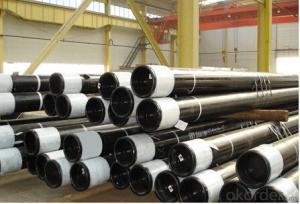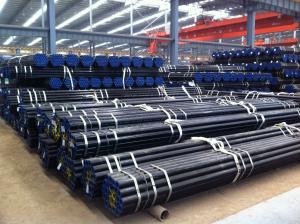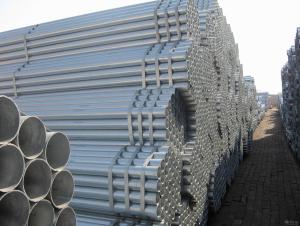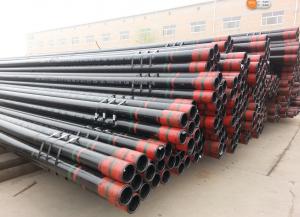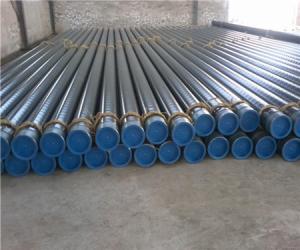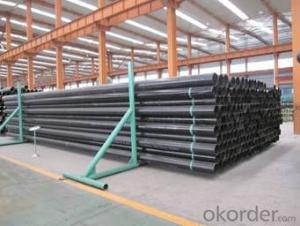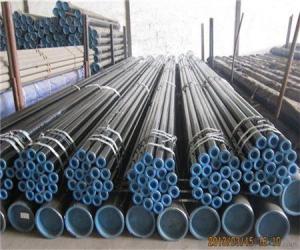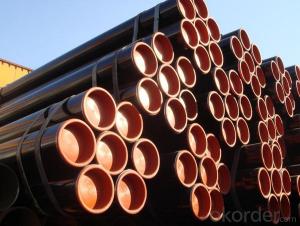Seamless Steel Pipe for Oil Casing Tube factory
- Loading Port:
- China Main Port
- Payment Terms:
- TT or LC
- Min Order Qty:
- 25 m.t.
- Supply Capability:
- 8000 m.t./month
OKorder Service Pledge
OKorder Financial Service
You Might Also Like
1、Structure of Oil Casing Tube:
Oil Casing Tube is formed by drawing a solid billet over a piercing rod to create the hollow shell. As the manufacturing process does not include any welding, Oil Casing Tube are perceived to be stronger and more reliable. Historically Oil Casing Tube was regarded as withstanding pressure better than other types, and was often more easily available than welded pipe.
2、Main Features of Oil Casing Tube:
• High manufacturing accuracy
• High strength
• Small inertia resistance
• Strong heat dissipation ability
• Good visual effect
• Reasonable price
3、Oil Casing Tube Specification:
Standard | GB, DIN, ASTM ASTM A106-2006, ASTM A53-2007 |
Grade | 10#-45#, 16Mn 10#, 20#, 45#, 16Mn |
Thickness | 8 - 33 mm |
Section Shape | Round |
Outer Diameter | 133 - 219 mm |
Place of Origin | Shandong, China (Mainland) |
Secondary Or Not | Non-secondary |
Application | Hydraulic Pipe |
Technique | Cold Drawn |
Certification | API |
Surface Treatment | factory state or painted black |
Special Pipe | API Pipe |
Alloy Or Not | Non-alloy |
Length | 5-12M |
Outer Diameter | 21.3-610mm |
Grade | 20#, 45#, Q345, API J55, API K55, API L80, API N80, API P110, A53B |
Standard | ASME, ASTM |
1) Material:20#(ASTM A 106/A53 GRB.API5LGRB,GB),45#,16Mn,10#.
2) Specification range:OD:21.3-610mm,WT:6-70mm,length:6-12m or according to the requirement of clients.
3) Excutive standards:GB,ASME API5L.ASTM A 106/A53,Despite of the above standards,we can also supply seamless steel pipe with standard of DIN,JIS,and so on,and also develop new products according to the requirements of our clients!
4) Surface:black lacquered,varnish coating or galvanized.
5) Ends:Beveled or square cut,plastic capped,painted.
6) Packing:bundles wrapped with strong steel strip,seaworthy packing.
4、Packaging & Delivery
Packaging Details: | seaworthy package,bundles wrapped with strong steel strip |
Delivery Detail: | 15-30days after received 30%TT |
5、FAQ of Oil Casing Tube:
①How is the quality of your products?
Our products are manufactured strictly according to national and internaional standard, and we take a test
on every pipe before delivered out. If you want see our quality certifications and all kinds of testing report, please just ask us for it.
Guaranteed: If products’ quality don’t accord to discription as we give or the promise before you place order, we promise 100% refund.
②How about price?
Yes, we are factory and be able to give you lowest price below market one, and we have a policy that “ for saving time and absolutely honest business attitude, we quote as lowest as possible for any customer, and discount can be given according to quantity”,if you like bargain and factory price is not low enough as you think, just don’t waste your time.Please trust the quotation we would give you, it is professional one.
③Why should you chose us?
Chose happens because of quality, then price, We can give you both.Additionally, we can also offer professional products inquiry, products knowledge train(for agents), smooth goods delivery, exellent customer solution proposals.Our service formula: good quality+good price+good service=customer’s trust
SGS test is available, customer inspection before shipping is welcome, third party inspection is no problem.
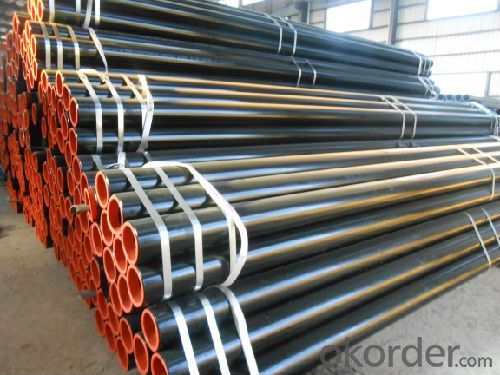
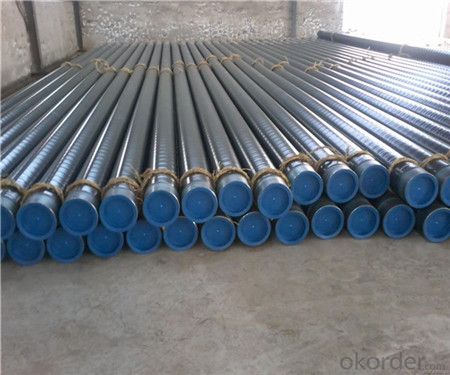
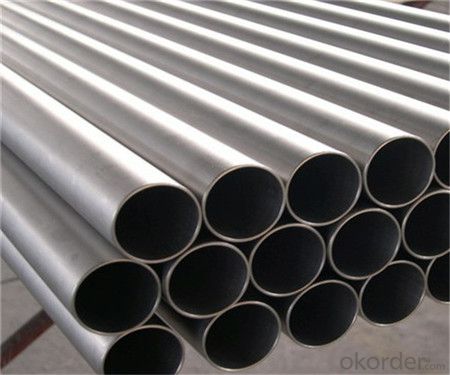
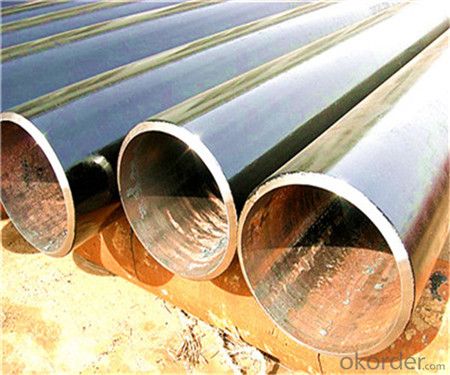
- Q: What is the role of steel pipes in the telecommunications industry?
- Steel pipes play a crucial role in the telecommunications industry as they are used for the installation of underground and overhead telecommunication cables. These pipes provide protection and support to the cables, ensuring their safety and longevity. Additionally, steel pipes are also used in the construction of communication towers and infrastructure, making them an essential component in establishing and maintaining reliable telecommunications networks.
- Q: Can galvanized steel tubes simmer?
- Galvanized steel pipe can simmer bending.Is a set of bending bending bending die, no matter what kind of equipment, most are used in pipe, mainly used for oil and gas, infusion, more plays an important role in aircraft and engine.
- Q: How are steel pipes used in the manufacturing of HVAC systems?
- Steel pipes are commonly used in the manufacturing of HVAC systems for various purposes. They are primarily used for transporting fluids such as water, refrigerants, and gases throughout the system. Steel pipes provide durability and strength, ensuring the safe and efficient transfer of these substances. Additionally, steel pipes are often used for structural support, acting as a framework for the HVAC system. Overall, steel pipes play a crucial role in the manufacturing of HVAC systems by facilitating fluid transportation and providing structural stability.
- Q: How are steel pipes used in the manufacturing of scaffolding?
- Steel pipes are commonly used in the manufacturing of scaffolding as they provide a strong and durable framework. They are used to create the main structure of the scaffolding, providing support and stability for workers and materials. The pipes are typically joined together using fittings, allowing for easy assembly and disassembly of the scaffolding system. Additionally, steel pipes can be easily adjusted to different heights and configurations, making them a versatile choice for scaffolding construction.
- Q: What is the flexibility of steel pipes?
- Steel pipes have a high level of flexibility, allowing them to be easily bent and shaped to fit different angles and curves. This flexibility makes steel pipes a versatile choice for various applications, including plumbing, construction, and industrial processes.
- Q: How are steel pipes protected against external impact or mechanical damage?
- Steel pipes are protected against external impact or mechanical damage through various methods. One commonly used technique is the application of a protective coating on the surface of the pipe. This coating acts as a barrier and helps to prevent direct contact between the pipe and any external objects or forces. Coatings such as epoxy, polyethylene, or polyurethane are often used as they provide excellent resistance to impact and abrasion. Another method of protection is the use of pipe supports or clamps. These supports are installed at regular intervals along the length of the pipe to provide stability and prevent excessive movement or vibration. They help distribute the load and absorb any external impacts, reducing the risk of mechanical damage. In addition, steel pipes can be reinforced by wrapping them with materials such as fiberglass, carbon fiber, or kevlar. These reinforcement materials add an extra layer of strength and durability, making the pipes more resistant to external impact and mechanical damage. Furthermore, measures such as burying the pipes underground or installing them within protective casings can also provide an additional layer of protection. This helps shield the pipes from direct contact with external objects, reducing the risk of damage from accidental impacts or environmental factors. Overall, a combination of protective coatings, supports, reinforcements, and proper installation methods help ensure that steel pipes are safeguarded against external impact or mechanical damage, thereby prolonging their lifespan and maintaining their structural integrity.
- Q: How are steel pipes used in the manufacturing of aerospace components?
- Steel pipes are used in the manufacturing of aerospace components for various purposes such as supporting structures, fuel systems, hydraulic and pneumatic systems, and exhaust systems. They provide strength, durability, and resistance to extreme temperatures and pressure, making them suitable for critical applications in the aerospace industry.
- Q: How do you calculate the pipe pressure loss coefficient for steel pipes?
- To determine the pressure loss coefficient for steel pipes, one can utilize the widely accepted Darcy-Weisbach equation. This equation calculates the pressure loss in pipes caused by friction. It can be represented as follows: ΔP = f × (L/D) × (V^2/2g) In this equation: - ΔP represents the pressure loss in units of pressure, such as psi or Pa. - f denotes the Darcy friction factor, a dimensionless value. - L signifies the pipe length in units of length, such as feet or meters. - D represents the pipe diameter in units of length, such as feet or meters. - V indicates the fluid velocity flowing through the pipe in units of velocity, such as ft/s or m/s. - g represents the acceleration due to gravity in units of acceleration, such as ft/s² or m/s². The Darcy friction factor (f) is a dimensionless parameter that quantifies the amount of frictional resistance in the pipe. For steel pipes, this factor can be determined using the Moody diagram. The Moody diagram presents a graphical relationship between the Reynolds number (Re) and the friction factor (f) for various pipe roughness values. To calculate the pressure loss coefficient, one should find the friction factor (f) value based on the Reynolds number (Re) and the relative roughness of the steel pipe (ε/D). The Reynolds number is calculated as follows: Re = (ρ × V × D) / μ In this equation: - ρ represents the fluid density in units of mass per unit volume, such as lb/ft³ or kg/m³. - V denotes the fluid velocity in units of velocity, such as ft/s or m/s. - D signifies the pipe diameter in units of length, such as feet or meters. - μ represents the dynamic viscosity of the fluid in units of force per unit area per unit time, such as lb/ft·s or kg/m·s. Once the Reynolds number (Re) and the relative roughness (ε/D) are determined, one can refer to the Moody diagram to find the corresponding friction factor (f). The pressure loss coefficient (K) can then be calculated using the following formula: K = f × (L/D) In this equation: - L represents the pipe length in units of length, such as feet or meters. - D denotes the pipe diameter in units of length, such as feet or meters. By utilizing the Darcy-Weisbach equation and the Moody diagram, one can accurately calculate the pressure loss coefficient for steel pipes. This calculation is crucial for the design and analysis of fluid flow systems.
- Q: How are steel pipes insulated?
- Steel pipes are commonly insulated using a variety of materials such as fiberglass, mineral wool, or foam insulation. These insulating materials are typically wrapped around the steel pipes to prevent heat loss or gain, as well as to protect against corrosion and condensation. Additionally, a vapor barrier may be applied to further enhance the insulation performance.
- Q: How are steel pipes used in the food and beverage industry?
- Steel pipes are commonly used in the food and beverage industry for various applications such as transporting liquids and gases, including water, beverages, and food ingredients. They are chosen for their durability, resistance to corrosion, and ability to maintain hygiene standards. Steel pipes are used to facilitate the flow of materials throughout the production process, ensuring safe and efficient operations in the food and beverage industry.
Send your message to us
Seamless Steel Pipe for Oil Casing Tube factory
- Loading Port:
- China Main Port
- Payment Terms:
- TT or LC
- Min Order Qty:
- 25 m.t.
- Supply Capability:
- 8000 m.t./month
OKorder Service Pledge
OKorder Financial Service
Similar products
Hot products
Hot Searches
Related keywords
